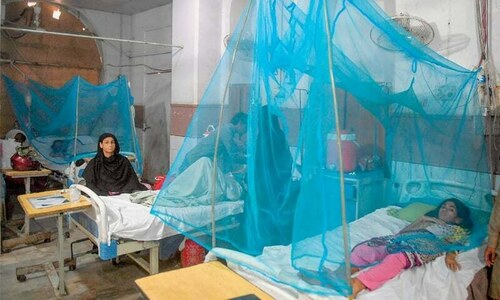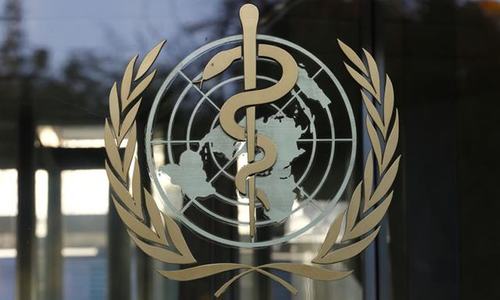KARACHI: As the cases of dengue and malaria have started to spread rapidly in the entire city during the ongoing monsoon rains, the fumigation campaign launched by the Karachi Metropolitan Corporation (KMC) and district municipal corporations (DMCs) may not yield required results until the stagnant water and sewage on the streets and inside the localities are not completely removed, it emerged on Saturday.
Informed sources said that diseases had already began to hit almost every locality and there was an alarming surge in cases of dengue, malaria, cholera, diarrhoea and dysentery due to highly unhygienic conditions across the city.
They said that dengue and malaria were spreading like epidemic due to breeding mosquitoes, while the cases of cholera, diarrhoea and dysentery were increasing mainly due to flies, ponds and puddles of filthy water and stinking heaps of garbage.
The sources in the major government hospitals of the city confirmed that the cases of dengue, malaria, diarrhoea and cholera were continuously increasing in the city.
Officials say frequent rounds of fumigation and removal of sewage, stagnant rainwater required to achieve results
They said that over 1,345 cases of dengue had been reported in the province in a year, of which 1,049 were related to Karachi.
According to the health department sources, 25 cases of dengue were being reported daily in the Dr Ruth Pfau Civil Hospital Karachi, 20 in the Jinnah Postgraduate Medical Centre and two cases were being reported daily in the Sindh Government Hospital, Liaquatabad till Aug 21.
They said that five cases of cholera were being reported in the CHK and 10 in JPMC, while 49, 111 cases of malaria were reported in Sindh this year, of which 550 were related to Karachi.
Besides, the sources said, more than 229,591 cases of diarrhoea in children under five years of age, and 264,940 cases of diarrhoea in people above five years of age had been reported in the province since March this year.
They said that 25,927 cases of dysentery among children under five years of age, and 34,991 cases among people above five years of age had been reported since March.
Need for constant fumigation
Sources in the KMC’s municipal services department told Dawn that the fumigation drives could not yield required results until the filth and sewage in the city was breeding grounds for mosquitoes and flies. They said that repeated rounds of fumigation were required to get rid of insects.
They conceded that the desired results of the ongoing fumigation drive might not be achieved in the presence of filthy stagnant water and oozing sewage in the city, especially in the cloudy weather.
The sources said that the fumigation campaign would be more effective with sufficient sunlight.
They said that the KMC had sufficient anti-insect chemical for spray in the entire city for the ongoing fumigation drive. However, they said, the city’s municipality would need more chemical so that the fumigation could be carried out repeatedly.
They said that the anti-insect chemical was sprayed by the KMC and DMCs across the city during the fumigation drive that was launched in the second week of August from district Central and culminated in the third week of the current month on the city’s outskirts within the jurisdiction of District Council Karachi.
KMC Municipal Services Director Mazhar Khan told Dawn that 25 spray vehicles carried out the fumigation in seven districts of the city. “The spray was carried out in the evening timing which is ideal for killing insects,” he said, adding that one district was covered daily during the campaign.
He said that the administration of all DMCs and District Council Karachi deputed officers to supervise the fumigation drive. “They were also directed to submit their respective reports in this regard,” he added.
THe KMC had procured 6,000 litres of Deltamethrin, a broad-spectrum insecticide that kills a wide range of insects and pests, including mosquitoes and flies. “We still have sufficient chemical which is also being given to DMCs for fumigation in their respective jurisdictions,” he added.
Published in Dawn, August 28th, 2022














































